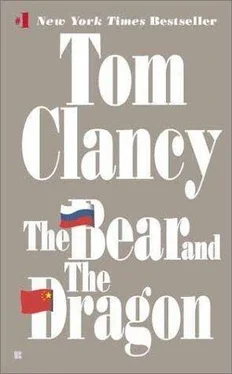Tom Clancy - The Bear and the Dragon
Здесь есть возможность читать онлайн «Tom Clancy - The Bear and the Dragon» весь текст электронной книги совершенно бесплатно (целиком полную версию без сокращений). В некоторых случаях можно слушать аудио, скачать через торрент в формате fb2 и присутствует краткое содержание. Год выпуска: 2001, ISBN: 2001, Жанр: Триллер, на английском языке. Описание произведения, (предисловие) а так же отзывы посетителей доступны на портале библиотеки ЛибКат.
- Название:The Bear and the Dragon
- Автор:
- Жанр:
- Год:2001
- ISBN:780425180969
- Рейтинг книги:3 / 5. Голосов: 1
-
Избранное:Добавить в избранное
- Отзывы:
-
Ваша оценка:
- 60
- 1
- 2
- 3
- 4
- 5
The Bear and the Dragon: краткое содержание, описание и аннотация
Предлагаем к чтению аннотацию, описание, краткое содержание или предисловие (зависит от того, что написал сам автор книги «The Bear and the Dragon»). Если вы не нашли необходимую информацию о книге — напишите в комментариях, мы постараемся отыскать её.
The Bear and the Dragon — читать онлайн бесплатно полную книгу (весь текст) целиком
Ниже представлен текст книги, разбитый по страницам. Система сохранения места последней прочитанной страницы, позволяет с удобством читать онлайн бесплатно книгу «The Bear and the Dragon», без необходимости каждый раз заново искать на чём Вы остановились. Поставьте закладку, и сможете в любой момент перейти на страницу, на которой закончили чтение.
Интервал:
Закладка:
“Well?” Jackson asked, looking at the large television on the wall of the Situation Room.
“Mancuso has his people at work in Hawaii. The Navy can give the Chinese a bad time, and the Air Force can move a lot of assets to Russia if need be,” said Army General Mickey Moore, Chairman of the Joint Chiefs. “It’s the land side of the equation that has me worried. We could theoretically move one heavy division-First Armored-from Germany east, along with some attachments, and maybe NATO will join in with some additional stuff, but the Russian army is in miserable shape at the moment, especially in the Far East, and there’s also the additional problem that China has twelve CSS-4 intercontinental ballistic missiles. We figure eight or more of them are aimed at us.”
“Tell me more,” TOMCAT ordered.
“They’re Titan-II clones. Hell,” Moore went on, “I just found out the background earlier today. They were designed by a CalTech-educated Air Force colonel of Chinese ethnicity who defected over there in the 1950s. Some bone-head trumped up some security charges against him-turned out they were all bullshit, would you believe-and he bugged out with a few suitcases’ worth of technical information right out of JPL, where he was working at the time. So, the ChiComms built what were virtually copies of the old Martin-Marietta missile, and, like I said, we figure eight of them are aimed back at us.”
“Warheads?”
“Five-megaton is our best guess. City-busters. The birds are bitches to maintain, just like ours were. We figure they’re kept defueled most of the time, and they probably need two to four hours to bring them up to launch readiness. That’s the good news. The bad news is that they upgraded the protection on the silos over the last decade, probably as a result of what we did in the Iraq bombing campaign and also the B-2 strikes into Japan on their SS-19 clones. The current estimate is that the covers are fifteen feet of rebarred concrete plus three feet of armor-class steel. We don’t have a conventional bomb that’ll penetrate that.”
“Why not?” Jackson demanded in considerable surprise.
“Because the GBU-29 we cobbled together to take out that deep bunker in Baghdad was designed to hang on the F-111. It’s the wrong dimensions for the B-2’s bomb bay, and the 111 s are all at the boneyard in Arizona. So, we have the bombs, okay, but nothing to deliver them with. Best option to take those silos out would be air-launched cruise missiles with W-80 warheads, assuming the President will authorize a nuclear strike on them.”
“What warning will we have that the Chinese have prepared the missiles for launch?”
“Not much,” Moore admitted. “The new silo configuration pretty well prevents that. The silo covers are massive beasts. We figure they plan to blow them off with explosives, like we used to do.”
“Do we have nuke-tipped cruise missiles?”
“No, the President has to authorize that. The birds and the warheads are co-located at Whiteman Air Force Base along with the B-2s. It would take a day or so to mate them up. I’d recommend that the President authorize that if this Chinese situation goes any further,” Moore concluded.
And the best way to deliver nuclear-tipped cruise missiles-off Navy submarines or carrier-based strike aircraft-was impossible because the Navy had been completely stripped of its nuclear weapons inventory, and fixing that would not be especially easy, Jackson knew. The fallout of the nuclear explosion in Denver, which had brought the world to the brink of a full-scale nuclear exchange, had caused Russia and America to take a deep breath and then to eliminate all of their ballistic launchers. Both sides still had nuclear weapons, of course. For America they were mostly B-61 and -83 gravity bombs and W-80 thermonuclear warheads that could be affixed to cruise missiles. Both systems could be delivered with a high degree of confidence and accuracy, and stealth. The B-2A bomber was invisible to radar (and hard enough to spot visually unless you were right next to it) and the cruise missiles smoked in so low that they merged not merely with ground clutter but with highway traffic as well. But they lacked the speed of ballistic weapons. That was the trouble with the fearsome weapons, but that was also their advantage. Twenty-five minutes from turning the “enable-launch” key to impact-even less for the sea-launched sort, which usually flew shorter distances. But those were all gone, except for the ones kept for ABM tests, and those had been modified to make them difficult to fit with warheads.
“Well, we just try to keep this one conventional. How many nuclear weapons could we deliver if we had to?”
“First strike, with the B-2s?” Moore asked. “Oh, eighty or so. If you figure two per target, enough to turn every major city in the PRC into a parking lot. It would kill upwards of a hundred million people,” the Chairman added. He didn’t have to say that he had no particular desire to do that. Even the most bloodthirsty soldiers were repelled by the idea of killing civilians in such numbers, and those who made four-star rank got there by being thoughtful, not psychotic.
“Well, if we let them know that, they ought to think hard about pissing us off that big,” Jackson decided.
“They ought to be that rational, I suppose,” Mickey Moore agreed. “Who wants to be the ruler of a parking lot?” But the problem with that, he didn’t add, was that people who started wars of aggression were never completely rational.
How do we go about calling up reserves?” Bondarenko asked.
Theoretically, almost every Russian male citizen was liable to such a call-up, because most of them had served in their country’s military at one time or another. It was a tradition that dated back to the czars, when the Russian army had been likened to a steamroller because of its enormous mass.
The practical problem today, however, was that the state didn’t know where they all lived. The state required that the veterans of uniformed service tell the army when they moved from one residence to another, but the men in question, since until recently they’d needed the state’s permission to move anywhere, assumed that the state knew where they were and rarely bothered, and the country’s vast and cumbersome bureaucracy was too elephantine to follow up on such things. As a result, neither Russia, nor the Soviet Union before it, had done much to test its ability to call up trained soldiers who’d left their uniforms behind. There were whole reserve divisions that had the most modern of equipment, but it had never been moved after being rolled into their warehouses, and was attended only by cadres of active-duty mechanics who actually spent the time to maintain it, turning over the engines in accordance with written schedules which they followed as mindlessly as the orders that had been drafted and printed. And so, the general commanding the Far East Military Theater had access to thousands of tanks and guns for which he had no soldiers, along with mountains of shells and virtual lakes of diesel fuel.
The word “camouflage,” meaning a trick to be played or a ruse, is French in origin. It really ought to be Russian, however, because Russians were the world’s experts at this military art. The storage sites for the real tanks that formed the backbone of Bondarenko’s theoretical army were so skillfully hidden that only his own staff knew where they were. A good fraction of the sites had even evaded American spy satellites that had searched for years for the locations. Even the roads leading to the storage sites were painted with deceptive colors, or planted with false conifer trees. This was all one more lesson of World War II, when the Soviet Army had totally befuddled the Germans so often that one wondered why the Wehrmacht even bothered employing intelligence officers, they had been snookered so frequently.
Читать дальшеИнтервал:
Закладка:
Похожие книги на «The Bear and the Dragon»
Представляем Вашему вниманию похожие книги на «The Bear and the Dragon» списком для выбора. Мы отобрали схожую по названию и смыслу литературу в надежде предоставить читателям больше вариантов отыскать новые, интересные, ещё непрочитанные произведения.
Обсуждение, отзывы о книге «The Bear and the Dragon» и просто собственные мнения читателей. Оставьте ваши комментарии, напишите, что Вы думаете о произведении, его смысле или главных героях. Укажите что конкретно понравилось, а что нет, и почему Вы так считаете.






![Александр Ирвин - Tom Clancy’s The Division 2. Фальшивый рассвет [litres]](/books/417744/aleksandr-irvin-tom-clancy-s-the-division-2-falsh-thumb.webp)




